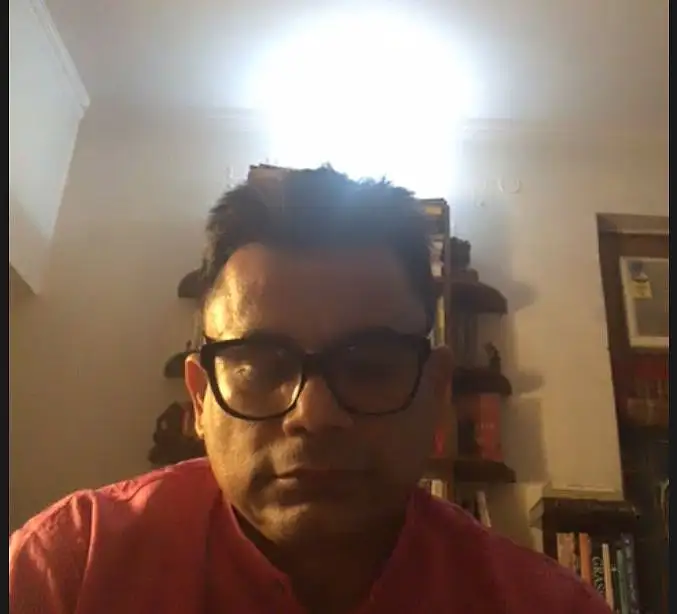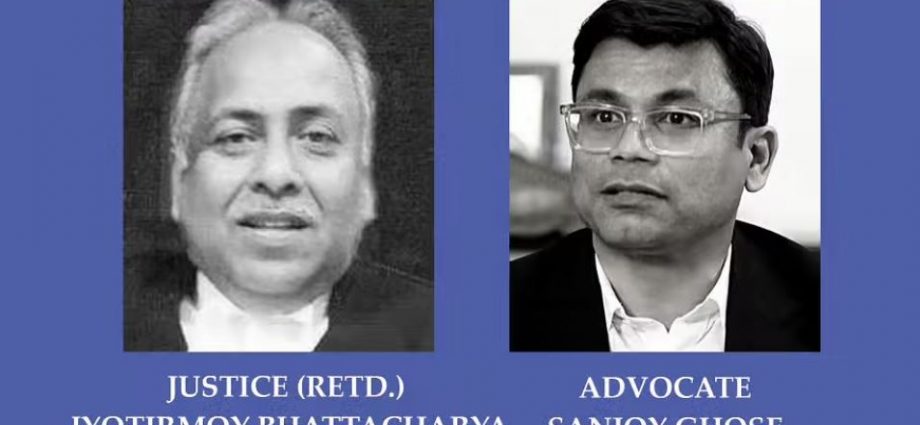Former Chief Justice of the Calcutta High Court, Jyotirmay Bhattacharya on Saturday observed that 90% of the litigation against the government could be avoided if the government functionary gave relief to the litigant at the stage of notice instead of dragging the litigation on.

The former Judge made the comment while expressing his view on the extent to which judicial delays could shape the popular perception of justice and the judiciary at Webinar hosted by the Bengal Intellectual Group on Saturday.
The webinar also saw Advocate Sanjoy Ghose of the Delhi High Court and Senior Advocate Jaydeep Kar of the Calcutta High Court speak on the theme Role of the Judiciary and the SC/ST Atrocities Act, 1989.
Advocate Sanjoy Ghose began by speaking of the need for a robust judicial system in a democracy. The institution was all the more important since it was the last bastion for the protection of people’s rights and freedoms, he highlighted.

In a democracy, it was paramount that “justice was not only done but also seen to be done”, he underscored, quoting a maxim.
How judges are appointed and the manner in which cases are handled to a large extent determined how justice was seen to be done in a democratic set-up, he added.
Quoting the sloka “dharmo rakshati rakshitak”, he emphasized that the institution of the judiciary serves as a bulwark against majoritarianism, especially when the government and the legislature tended to yield to populism.
Coming to the central subject of his address, he stated that the collegium system was envisaged as a mechanism to reduce the public perception of the executive and judiciary being interlinked.
However, Advocate Ghose remarked that the collegium ultimately represented only a formal handing over of the authority to the judiciary. The “give and take” between the executive and the judiciary has remained, he opined.
To ensure that judges do not pronounce judgments in the hope of future reward or favourable appointment, it was necessary to devise a mechanism of some kind, Ghose said. For this, a system where Judges are remunerated post-retirement could be put in place, he opined. This could make sure that justice was delivered by judges without fear or favour.
Along with the decision of who was chosen to the judiciary, the manner in which judicial time is allotted is also crucial in shaping the public perception of Courts, Advocate Ghose said.
In this regard, he noted that the Supreme Court’s decision to hear a matter relating to the use of Artificial Reproductive Techniques on animals and the legal status of animals, when there were other important matters pending, sent out a wrong message about how judicial time was allotted.
On this aspect, he referred to the pending cases relating to the abrogation of Article 370 of the Constitution, the habeas corpus pleas of Jammu and Kashmir politicians who were “unofficially” detained, the legality in the issue of electoral bonds, demonetisation, and migrants’ rights issues before the Supreme Court.
He ended his address with a reference to the iconic US Supreme Court Judge Ruth Bader Ginsburg who inspired many thousands of people. The Judge passed away on Saturday.
Senior Advocate Kar dedicated his segment to a discussion on the Scheduled Castes and Scheduled Tribes (Prevention of Atrocities) Act, 1989.
He began by quoting Gandhi’s statement that he desired to be reborn as a Harijan to “share their sorrows, sufferings, and the affronts levelled at them”, so that he could endeavour to free himself and them from that miserable condition.
Noting that the 1989 legislation was enacted to protect the oppressed communities from the aggression of the dominant communities, he traced the evolution of the enactment from its root in Constitutional provisions for equality, to its present form.
The legislation was preceded by two earlier Acts, the Untouchability (Offences) Act, 1955 and the Protection of Civil Rights Act, 1955. Because these legislations were found inadequate, the Scheduled Castes and Scheduled Tribes (Prevention of Atrocities) Act, 1989 came to be.
He delineated the features of the legislation as follows:
- An expanded definition of the term ‘atrocity’ against a person belonging to the SC/ST community;
- The distinctive procedural framework for investigation and trial of offences;
- Establishment of Special Courts to try offences under the legislation;
- The unavailability of the remedy of a pre-arrest bail and release under the Probation of Offenders Act (the legislation permits the release of offenders for good conduct).
Citing Supreme Court judgments, he stated that the Court has consistently emphasized on the need for the better implementation of the legislation, and better training of personnel at all levels to behave with sensitivity.
He also exhorted persons of influence in the community to initiate conversations among people within communities about the legislation as well as their rights.
The final address was by former Chief Justice of the Calcutta High Court Jyotirmoy Bhattacharya, who expounded on the judiciary’s position vis-à-vis the other two estates in the Indian federal polity.
After a detailed enunciation on the judicial system, right from the subordinate courts to the Apex Court through a system of appeals, Justice (retd.) Bhattacharya tried to analyse possible safeguards against the erosion of public confidence in the judiciary. In this regard, he suggested:
- One, ensuring the independence of the judiciary
- Two, avoiding political interference with the judiciary
- Three, stopping post-retirement appointments
- Four, tacking judicial delay
Speaking about the need for judicial accountability, Justice (retd.) Bhattacharya emphasized that fair criticism of judgments should always be welcome. This was especially required to avoid errors being perpetuated in future judgments.
Echoing Advocate Ghose’s sentiments, the Chief Justice also emphasized that stopping post-retirement appointments could improve the public perception about the judiciary.
The former Chief Justice did not mince his words when speaking of delays in the legal system. He pointed out that judges were being assigned with more than their designated load which also possibly resulted in delay.
He also claimed that 90% of litigation against the government could be avoided if the government functionary gave relief to the litigant at the stage of notice instead of dragging the litigation on.
The judge also opined that increasing the number of courts could help improve the justice delivery system as opposed to setting up alternative dispute resolution fora.
The discussion came to a close after the convenor of the Webinar spoke a few words.
গত শনিবার ১৯ সেপ্টেম্বর হাইকোর্টের প্রাক্তন প্রধান বিচারপতি শ্রী জ্যোতির্ময় ভট্টাচার্য একটি আলোচনাসভায় বলেছেন যে সরকারের বিরুদ্ধে যে সকল মামলা হয়, তার ৯০% মামলা এড়িয়ে যাওয়া যায় যদি সরকার কর্মচারীরা উদ্যোগী হন। সরকারী আধিকারিকেরা যদি কোনো মামলাকারী যখন সরকারী দফতরকে নোটিস দেওয়ার সময়েই যদি তাদের দাবী সহমর্মিতার সঙ্গে বিচার করেন তবে সেই মামলাকারী সরকারের বিরুদ্ধে আর মামলা করবেন না।
বেঙ্গল ইন্টেলেকচ্যুয়াল গ্রুপের একটি ওয়েবিনারের মাধ্যমে তাঁর বক্তব্য পেশ করার সময় তিনি মামলার বিচারে বিলম্ব হবার ফলে সাধারণ মানুষের মনে বিচারব্যবস্থার সম্পর্কে ধারণা নিয়ে শঙ্কা প্রকাশ করেন।
উক্ত ওয়েবিনারে দিল্লি হাইকোর্টের অ্যাডভোকেট সঞ্জয় ঘোষ এবং জয়দীপ কর, কলকাতা হাইকোর্টের সিনিয়র অ্যাডভোকেটও “বিচার ব্যবস্থার ভুমিকা ও তপশিলী জাতি ও উপজাতির নৃশংশতা আইন ১৯৮৯” – এই বিষয় নিয়ে কথা বলেন।
অ্যাডভোকেট সঞ্জয় ঘোষ গণতান্ত্রিক কাঠামোতে এক বলিষ্ঠ বিচারব্যবস্থার প্রয়োজনীয়তার বিষয় তার বক্তব্য রাখেন। আইনের প্রতিষ্ঠান অত্যন্ত জরুরী কারণ সাধারণ মানুষের অধিকার স্থাপন করতে এটিই শেষ আশ্রয়।
ম্যাক্সিম গোর্কিকে উদ্ধৃত করে তিনি বলেন, ‘গণতন্ত্রে শুধু বিচার ব্যবস্থার উপস্থিতিই যথেষ্ট নয়, ন্যায়বিচার মানুষ পাচ্ছে কী না সেটা দেখারও প্রয়োজন রয়েছে।‘
যে ভাবে বিচারকদের নিযুক্তি হয় আর যে ভাবে মামলা চলে তা দিয়েই অনুমান করা যায় গণতান্ত্রিক কাঠামোতে কী ভাবে বিচার পাওয়া সম্ভব।
“ধর্ম রক্ষতি রক্ষিতঃ” – এই শ্লোকটি উল্লেখ করে তিনি জোর দিয়ে বলেন, সংখ্যাগুরুর আধিপত্যের বিরুদ্ধে বিচারব্যবস্থা প্রহরীর মত, বিশেষতঃ যখন সরকার ও আইনপ্রণেতারা সস্তা জনপ্রিয়তা অর্জন করবার লক্ষ্যে কাজ করে। তাঁর বক্তব্যের মূল বিষয় সম্বন্ধে উনি বলেন, বিচার বিভাগ ও শাসন বিভাগের পারস্পরিক যোগাযোগ রয়েছে, তা নিয়ে জনসচেতনতা খর্ব করবার মাধ্যম হিসেবেই ‘কলেজিয়াম সিস্টেম’কে দেখা হয়ে থাকে।
আ্যডভোকেট ঘোষ মন্তব্য করেন ‘কলেজিয়াম সিস্টেম’ আসলে বিচার বিভাগের কর্তৃত্ব বিচার বিভাগের হাতে থাকবার এক আনুষ্ঠানিক ব্যবস্থা মাত্র। ‘দেওয়া ও নেওয়া’র প্রচলন শাসন বিভাগ ও বিচার বিভাগের মধ্যে রয়েছে, বলে অভিমত দেন।
তিনি আরও বললেন যে বিচারকের লক্ষ্য ভবিষ্যতে পুরস্কৃত হওয়া বা গুরুত্বপূর্ণ পদ পাওয়া নয় – প্রয়োজন একটি সুষ্ঠ পদ্ধতির, যা বিচারক মন্ডলীদের অবসরের পর তাদের আয়ের ব্যবস্থা থাকবার দরকার রয়েছে। এই ব্যবস্থাটি হলে বিচারকেরা ‘ভয় বা লোভের’ বশবর্তী হয়ে বিচার করবেন না বলে উনি আশা ব্যক্ত করেন।
শুধুমাত্র বিচারক নিযুক্তির সিদ্ধান্ত নয়, বিচারের জন্য ব্যয় করা সময়েরও সুষ্ঠ নির্ধারণ করা প্রয়োজন, যা জনসাধারণের মনে বিচারব্যবস্থা সম্পর্কে ধারণা পালটাবে।
এই মর্মে তিনি জন্তুদের ওপর কৃত্রিম প্রজনন পদ্ধতি এবং তাদের আইনি অধিকার নিয়ে সুপ্রিম কোর্টের একটি শুনানির দিকে দৃষ্টি আকর্ষণ করে তিনি বলেন যখন গুরুত্বপূর্ণ মামলা অমিমাংসিত পড়ে আছে, সেই সময় এমন একটি মামলার শুনানির জন্য সময় নির্ধারণ করা, ভুল বার্তা পাঠায় কীভাবে আদালতের সময় বিভিন্ন মামলার জন্য নির্ণয় করা হয়, সে বিষয়ে।
এই প্রসঙ্গে তিনি সংবিধানের ধারা ৩৭০’এর অপব্যবহার, জম্মু-কাশ্মীরের নেতাদের অবরুদ্ধ করার পরোয়ানা, নোটবন্দী, শরণার্থী আর পরিযায়ী মানুষের আইনানুগ অধিকার নিয়েও হওয়া মামলাগুলির উল্লেখ করেন।
এর পাশাপাশি তিনি তার বক্তব্যে মার্কিন সুপ্রিম কোর্টের প্রখ্যাত বিচারপতি রুথ বেডার গিন্সবুর্গের কথা বলেন যিনি সেই দিনই দেহত্যাগ করেন।
অ্যাডভোকেট করও “বিচার ব্যবস্থার ভুমিকা ও তপশিলী জাতি ও উপজাতির নৃশংশতা আইন ১৯৮৯” নিয়ে কথা বলেন।
তিনি মহাত্মা গান্ধীর একটি উদ্ধৃতির উল্লেখ করে বলেন গান্ধীজি চেয়েছিলেন, ‘যদি আবার জন্ম নিতে হয় তাহলে তিনি হরিজন হয়ে জন্ম নিতে চাইবেন যাতে তিনি সে সকল মানুষের দুঃখ, কষ্ট এবং অত্যাচার ভাগ করে নিতে পারবেন এবং সেই পরিস্থিতি থেকে নিজেকে এবং সেই সমগ্র সম্প্রদায়কে তাদের পরিস্থিতি থেকে মুক্ত করতে পারবেন।‘
১৯৮৯ সালের সংসদীয় আইন, সমাজের প্রভাবশালী সম্প্রদায়ের হাত থেকে নিপীড়িতদের রক্ষার্থে প্রস্তাবনার উল্লেখ করে, তিনি সমরসতার সাংবিধানিক দায়িত্বরক্ষার জন্য আইনী প্রস্তাবনার বিবর্তন আলোচনা করেন। ইতিপূর্বে আনটাচেবিলিটি (অফেন্স) অ্যাক্ট ১৯৫৫ আর প্রোটেক্সান অফ সিভিল রাইটস অ্যাক্ট ১৯৫৫ বলবৎ করা হয়েছে। যেহেতু এই দুটি আইন খুব একটা কার্যকরী আইন ছিল না তাই নতুন আইন – শিডিউল্ড কাস্ট অ্যান্ড শিডিউল্ড ট্রাইবস (প্রিভেন্সন অফ অ্যাট্রসিটি) অ্যাক্ট ১৯৮৯ প্রণয়ন করা হয়।
এই আইনের ক্ষেত্রে কিছু মূল বিষয় চিহ্নিত করা হয়ঃ
- তপশিলি জাতি ও উপজাতির ক্ষেত্রে ‘নিপীড়ন’ শব্দের অর্থ;
- অপরাধের আইনানুগ তদন্ত ও বিচারের ক্ষেত্রে পদ্ধতিগত কাঠামোর প্রতিষ্ঠা;
- নতুন বিশেষ আদালতের প্রতিষ্ঠা যার দ্বারা আইনী বিভাগের অপরাধ বিচার করা যাবে;
- আ্যন্টিসিপেটরি বেইল বা আইনী এফাজতে নেওয়ার আগে জামিনের ক্ষেত্রে কোনও সুষ্ঠ পদ্ধতির অভাব যা প্রোবেশন অফ অফেন্ডার্স অ্যাক্টের অন্তর্ভুক্ত;
সুপ্রিম কোর্টের দৃষ্টান্ত দিয়ে তিনি বুঝিয়েছেন কী ভাবে বিচার বিভাগ নিয়মিতভাবে আইনের প্রতিষ্ঠা ও সমস্ত স্তরের আধিকারিকদের উপযুক্ত প্রশিক্ষণের মাধ্যমে সহমর্মিতার সঙ্গে বিষয়টি দেখবার ওপর জোর দিয়েছেন।
সমাজের প্রভাবশালী মানুষদের উদ্যোগী হয়ে সমাজের নানা স্তরে মানুষকে তার অধিকার ও আইন সম্পর্কে সচেতন করা কর্তব্য বলে তিনি মন্তব্য করেন।
শেষে কলকাতা হাইকোর্টের মুখ্য বিচারপতি শ্রী জ্যোতির্ময় ভট্টাচার্য বিচার বিভাগের অবস্থান ও ভারতীয় যুক্তরাষ্ট্রের অন্য দুই স্তম্ভ নিয়ে বক্তব্য রাখেন। বিচার বিভাগে সম্পর্কিত, জেলা আদালত থেকে শুরু করে শীর্ষ আদালতে আবেদনমূলক ব্যবস্থার পর্যালোচনা করে, অবসরপ্রাপ্ত বিচারক শ্রী ভট্টাচার্য্য বিচার বিভাগের জনসাধারণের ক্ষয়িষ্ণু বিশ্বাসের পুনরুদ্ধারের জন্য কিছু পদক্ষেপের উল্লেখ করেন।
সেগুলি হল,
- বিচার বিভাগের স্বাধীনতা
- রাজনৈতিক হস্তক্ষেপ বর্জন
- অবসরপ্রাপ্ত বিচারকেরদের পুনর্নিযুক্তি বর্জন
- অযথা বিচারের বিলম্ব
বিচারব্যবস্থার গ্রহণযোগ্যতার প্রয়োজনীয়তা নিয়ে উনি বলেন, বিচারব্যবস্থাকে গঠনমূলক সমালোচনাকে স্বাগত জানাতে হবে। পরবর্তীকালে ত্রুটিপূর্ণ বিচারের জন্য এটি অত্যন্ত গুরুত্বপূর্ণ বলে উনি মন্তব্য করেন।
অ্যাডভোকেট ঘোষের কথায় সহমত প্রকাশ করে তিনি বলেন, অবিলম্বে অবসরপ্রাপ্ত বিচারকদের পুনর্নিযুক্তি বন্ধ করতে হবে। বিচারে বিলম্ব হওয়া নিয়ে তিনি স্পষ্ট করেছেন, এই প্রবণতা অবিলম্বে দূর হওয়া দরকার। এই মুহুর্তে তাদের ক্ষমতার চেয়ে বেশি মামলা বিচারকদের দেখতে হয়, যার ফলে সময়মত বিচার করা সম্ভব হয়ে ওঠে না।
তিনি দাবী করেন যে সরকারের বিরুদ্ধে ৯০% মামলা মিটিয়ে ফেলা যায় যদি সরকার ইচ্ছুক থাকে।
এই মুহুর্তে আদালতের সংখ্যাবৃদ্ধির দরকার যা বিচার বিভাগকে দ্রুত মামলা নিষ্পত্তি ক্ষমতা দিতে পারে, যা কোনোমতেই অন্য কোনো বিবাদ নিষ্পত্তিকারী সংস্থা গঠন করে করা সম্ভব নয়।
অংশগ্রহণকারীদের প্রতি সঞ্চালকএর ধন্যবাদ জ্ঞাপনের মাধ্যমে আলোচনাসভাটি সমাপ্ত হয়।

